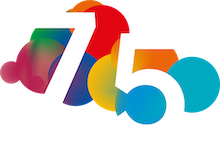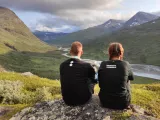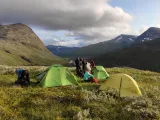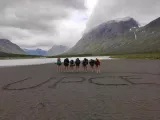Published: 24.08.2021
Students of the University of Pardubice have returned from field research in Lapland with unique experience and material for evaluation. During the isolation, they covered in a closed group almost 300 kilometres through the wilderness of Swedish national parks without any mobile network and Internet coverage. The ability to go offline was the biggest challenge.
Being online, whether via computer or mobile, is an everyday part of life today. However, the students had to do for 19 days without the comfort of modern times and any signal. In addition, nature, terrain and white nights beyond the Arctic Circle, which erased the boundaries between day and night, complicated their Internet detox in the wilderness. This led to a unique research experience – students lost track of time. "As a result, the need for a time frame proved to be even more important to them than the lack of a telephone signal or the Internet," says Adam Horálek, head of the Department of Social and Cultural Anthropology at the Faculty of Arts and Philosophy.
The students themselves admit that they only missed contacts and information they normally receive via the Internet and social networks for the first few days and were able to disengage from them. "We found out how important gestures of mutual help are for us, and that life can be quite simple without disturbing influences," said Vojtěch Juda, a second-year student of the postgraduate Social and Cultural Anthropology.
For students of Social and Cultural Anthropology, the extreme form of isolation was part of the research of autoethnography and ethnography of the social dynamics of the isolated microgroup. "In practice, it turned out that even a group of eight people is already a society – a social group. It has different tools and relationships than when you travel with two or four people. Being isolated from the external environment made it a society that naturally and gradually created new systems of values, norms, rules, but also social pressure. On the one hand, it restricted the freedom of the individual, on the other hand, it naturally allowed to manage society effectively," said Horálek, adding: "Although I was still the leader of the group, several parallel management tools were created that were independent of me. With the group being isolated, these processes, forces and standards were more visible and identifiable."
The researchers are now embarking on a second phase, the analysis. It was the duty of each member of the expedition to keep a field diary as one of the main anthropological methods. In addition, they were given daily tasks and kept an evaluation form, which will serve as a quantifying and confrontational material for comparison with data from diaries. Students brought a large amount of film and photographic material for the study focus of visual anthropology. "We now have a huge amount of data. However, we plan to publish the first preliminary results at the Sociocon 2021 conference in October," said Horálek, who believes that it will be possible to compile a professional monograph from the analysis of diaries and that research experience will inspire students in writing their theses.























